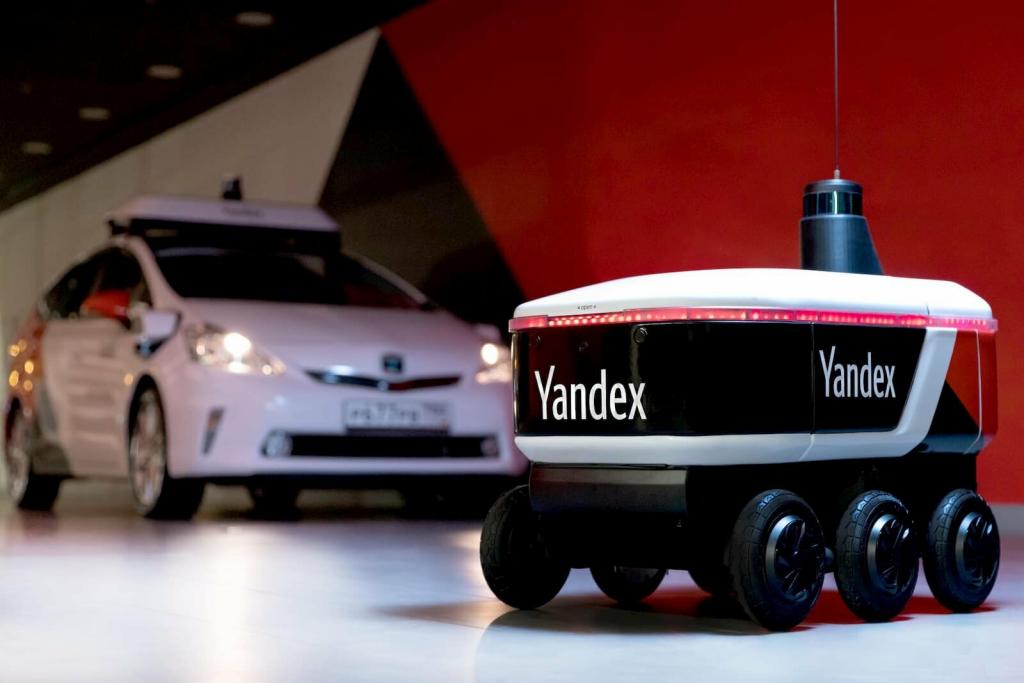
Yandex, which is the 5th largest search engine globally, has now begun to test robotic deliveries. The Russian tech giant is working on an autonomous package carrier to help deliver goods efficiently. Yandex.Rover, as the package carrier is being called, will compete directly with the likes of Amazon, Postmates and Starship. The trial is being run by Yandex’s self-driving division. Let us take a look at Yandex robotic deliveries in detail.
Where are the Yandex robotic deliveries available now?
Currently, the robots carry documents from Yandex offices across Moscow to a shuttle. It rolls along slowly as if a person were walking. It works efficiently even in the dark thanks to LiDAR technology. It is being tested if it can operate in Moscow’s bone-chilling winters and sultry summers. The robot intelligently identifies pedestrians and pets in the way and avoids colliding with them. It can also plan routes well in advance and detect obstacles and hurdles that may come in its path. Yandex. Rover, being a package carrier, is of the same size as a suitcase.
Yandex.Rover will be supervised remotely while it is being tested. In the near future, Yandex plans to use these robots for delivering groceries, restaurant orders, and meal-kits. It is also important to note that Yandex runs an online store called Beru, and the company plans to use the robots in its warehouse. Some insiders reveal that the robots may be sold to third party clients and external companies as well.
Yandex robotic deliveries pose ethical questions
There are many ethical concerns one may raise when it comes to robotic deliveries. Firstly, robotic suitcases that roll along footpaths or streets may cause confusion among pedestrians and drivers. They may get distracted and run into accidents, or fall down and get injured. Most urban footpaths are already crowded and do not have space for people to walk along without jostling.
Robotic delivery units such as Yandex. Rover may seem good on paper but may be impractical in most cities and towns. The Moscow experiment will prove to be an interesting case study if we were to implement robotic deliveries in other major cities. In addition, robotic technology may threaten the livelihoods of many delivery agents. Automation is expected to put millions of people out of their jobs, and that may result in severe social and economic crises.
Finally, companies cannot take a utilitarian approach and decide to just use robots, when people’s livelihoods depend on making these deliveries. Of course, investors may seem unhappy when they realize their favorite tech company is unwilling to implement robotic delivery units. Yet, this may prove to be a good decision in the long run, until Yandex proves to us otherwise.
Yandex.Rover may find it hard to enter foreign markets
Many companies have toyed with using drones and robots to deliver goods in the past. We had once written about how Swiss Post had planned to use drones to deliver post way back in 2015. Unfortunately, Amazon ran into some trouble with the FAA when it decided to use drones to make deliveries. In fact, Amazon began to consider using taxis to make same say deliveries. So much for advanced technology, one might say.
It is not clear if Yandex robots will ever make their way out of Russia. Even if Yandex decides to operate outside Russia, it might run into trouble with regulatory authorities, which have strict rules against drones and robots making deliveries. However, it needs to be borne in mind that Yandex.Rover rolls along the road, and poses no risk to people or traffic. Yet, we doubt other countries will be ready to let suitcase-sized delivery robots to roll along footpaths and streets.
Would you be comfortable if a robotic suitcase rolled alongside you while you were walking on the pavement?










